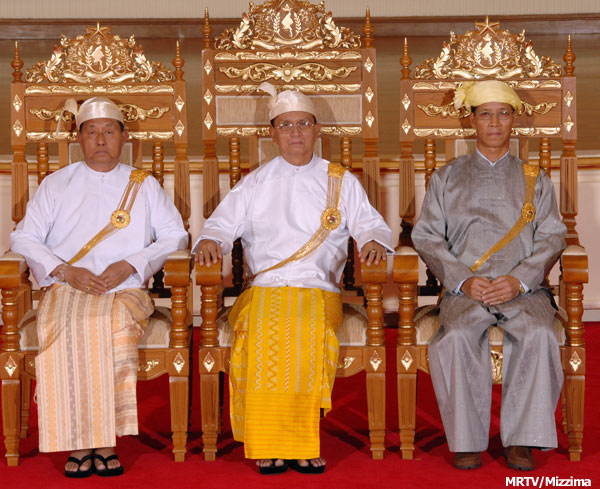The final, 7th step of the Burmese junta’s so-called roadmap to democracy has been completed with the handing over of power to the newly installed government led by President Thein Sein on March 30.

The question everyone is asking is whether the new government, led by a retired general, can do any better than the previous military government or will it be more of the same?
Many people argue that whatever benefits there are will largely go to military officials and their associates.
Many challenges lie ahead for President Thein Sein, who celebrates his 66th birthday on April 20.
He faces on-going politially sensitive issues. The opposition and many world leaders are calling for the release of almost 2,100 political prisoners. The pro-democracy opposition is calling for national reconciliation. There’s the life and death issue of cease-fire groups along the border, which are still refusing to accept the junta’s offer of transforming their armies into a government-controlled Border Guard Force. Other challenges include government corruption and how to jump-start a stagnant economy which suffers from a dysfunctional banking system.
In addition, there is the issue of division of power between the central government and regional and local governments.
And on top of all that is a great overhanging question: now that the country has a parliamentary government with civilians in control, how much power, if any, will be taken away from the previously military-controlled government?
According to the President’s inaugural address, the new government will put great emphasis on building up the armed forces, citing possible threats and Burma’s need to modernise its forces.
In the military-created budget appropriation for the 2011-2012 fiscal year, just a little over 1 percent of the total budget was earmarked for health care. Likewise, education got a dismal token amount, while nearly 25 percent went to the military.
Another worry is that the new Constitution confers real sovereign power to the National Defence and Security Council (NDSC), which, in terms of real power, overshadows the newly installed civilian government.
The Constitution stipulates that the president must seek consent of the council on certain specified decisions, taken the decisions away from the Parliament. The NDSC is clearly dominated by hardliners and is made up of the president, two vice presidents, the speakers of both houses, the commander in chief, the deputy commander in chief, the defence minister, the foreign minister, the home minister and the border affairs minister.
Meanwhile, real work is going to be required from the new Parliament, including allocating more money for research and investment, education and health care, while also addressing the need for more electrical power and more water across the country.
President Thein Sein should be given some credit for stressing the need to protect the environment in his inaugural address, but we have to wait to see if the government follows through by enforcing existing law, passing better laws and prosecuting violators.
Surprisingly, Thein Sein didn’t say a single word about the powerful earthquake which hit eastern Shan State and killed at least 74 people just a week before he took office.
However, Thein Sein gets good marks from some observers for being a good listener and one of the least corrupt of the generals, but he must now walk the walk rather than talk the talk in his inaugural address, which was filled with a lot of pleasing words.
Before, he could give excuses about being a general in a military government, but no more. Now he’s the highest elected civilian in a civilian government.
In recent weeks, the Burmese people have witnessed calls for democracy throughout the Middle East. Now that there is a Burmese Parliament with elected officials, the people are expecting something better than they received from the military government.
How much President Thein Sein can deliver on making the lives of the people better will determine the people’s attitudes about the new government. The jury is still out.


